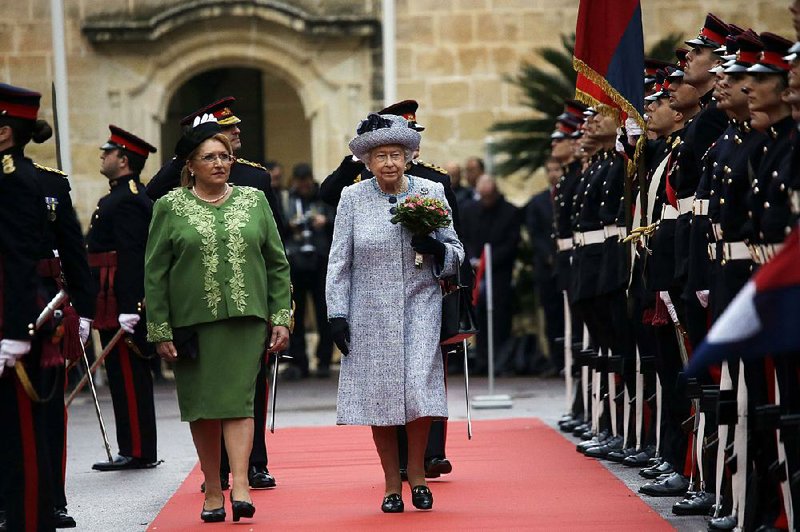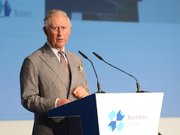VALLETTA, Malta -- Queen Elizabeth II arrived Thursday in the Mediterranean island of Malta for a summit of the Commonwealth, the post-colonial international alliance that she has helped for decades to unite.
Between 1949 and 1951, Elizabeth's husband, Prince Philip, was stationed on the island as a Royal Navy officer, and she lived as a military wife, rather than a duty-burdened heir to the throne.
"She was able to drive her own car around, go to the cinema, go to polo matches, go to dances at the Phoenicia Hotel," royal biographer Hugo Vickers said. "She has been known to say Malta is the only place in the Commonwealth, other than Britain," that she can call home.
Many people in Malta retain a deep affection for the 89-year-old queen.
At the start of the three-day state visit, the monarch was welcomed in the capital, Valletta, by Prime Minister Joseph Muscat, receiving flowers from his twin daughters, Soleil Sophie and Etoile Ella.
The queen wore gray, matching the unseasonably wet, blustery weather that forced the welcome ceremony from outdoors in St. George's Square to inside the presidential San Anton Palace.
Today, the queen will open the Commonwealth Heads of Government Meeting, a biennial summit of leaders from Britain and many of its former colonies.
The queen has given up long-haul travel and is unlikely to attend the 2017 Commonwealth conference, whose location has not been decided. Her absence would be a blow to a 53-nation organization that is close to her heart, but is seen by some as a vestige of an empire with an uncertain mission in the 21st century.
The Commonwealth links more than 2 billion people on five continents, in countries ranging from India and Australia to small island states such as Tonga and Vanuatu. It espouses a set of values -- democracy, good governance, human rights, free trade, racial equality and the rule of law -- and says membership results in cheaper trading costs and other economic benefits.
It has had modest success expanding its membership beyond former British colonies, with Mozambique and Rwanda joining in recent years.
But Zimbabwean President Robert Mugabe pulled his country out of the group in 2003 after the nation was suspended for widespread human-rights abuses. And Gambia withdrew in 2013, calling the Commonwealth a "neo-colonial institution."
New Canadian Prime Minister Justin Trudeau, however, says the Commonwealth still has a place in the world. He said President Barack Obama and German Chancellor Angela Merkel "were very pleased that I was going to the Commonwealth, because they wanted me to make a real effort to talk about climate change" ahead of a major U.N. climate conference that begins in Paris next week.
Climate change is a focus of this year's Commonwealth summit, and leaders hope to agree on proposals, including debt-for-environmental-action swaps, to encourage small nations to cut emissions.
The heads of government will discuss issues ranging from violent extremism to mass migration, with the aim of helping smaller member states cope with the impact.
Michael Lake, director of the Royal Commonwealth Society -- a charity that promotes the organization's values -- said the Commonwealth could be an important "soft power" force but needs to regain the sense of purpose that saw it oppose apartheid in South Africa and help former colonies make the transition to independence.
"To be relevant, the Commonwealth has got to stand for something," Lake said. "And in the last few years, the last decade, the Commonwealth has not stood for something on the global stage."
The queen's commitment has done much to unite the often fractious group. She has visited nearly every Commonwealth nation, often multiple times, over her 63-year reign.
Vickers said at Commonwealth summits, the queen "sees four prime ministers in the morning and four in the afternoon. And it's a bit like being a doctor -- they tell her all their problems. And they all come away saying how well-informed she is about their country."
Prince Charles, the 67-year-old heir to the British throne, is attending the summit with his mother but will not automatically succeed her as Commonwealth leader.
Commonwealth officials say the heads of government and secretary-general will decide who, if anyone, should head the group next. Many Commonwealth politicians regard Charles with respect, but not the affection bestowed on his mother.
Lake said the change of monarchs would be a "critical moment" for the Commonwealth.
"All options are open then," he said. "But the sense I get is that if it happened now, it would be pretty likely that Charles would become head of the Commonwealth without too much of a bump in the road."
A Section on 11/27/2015

